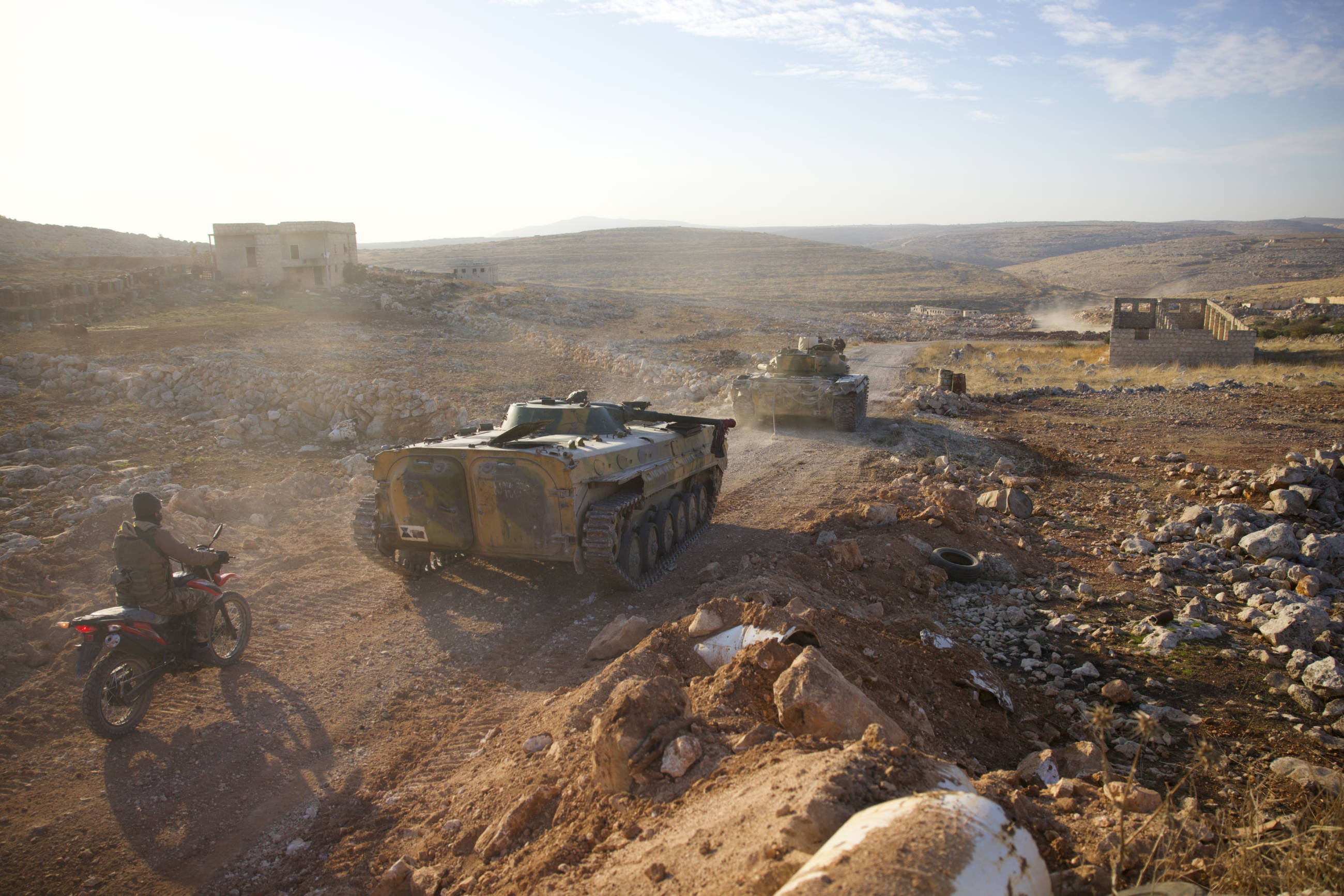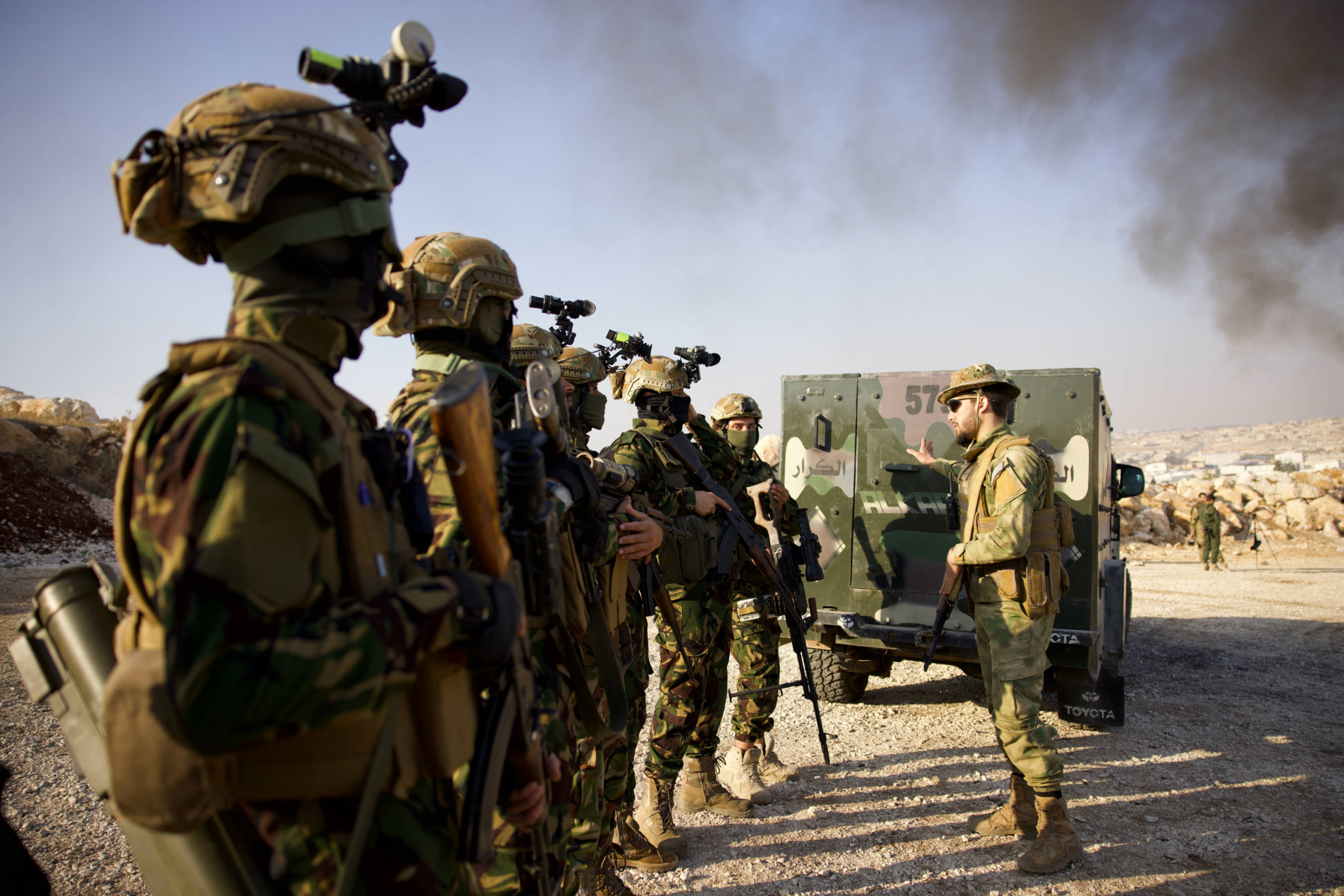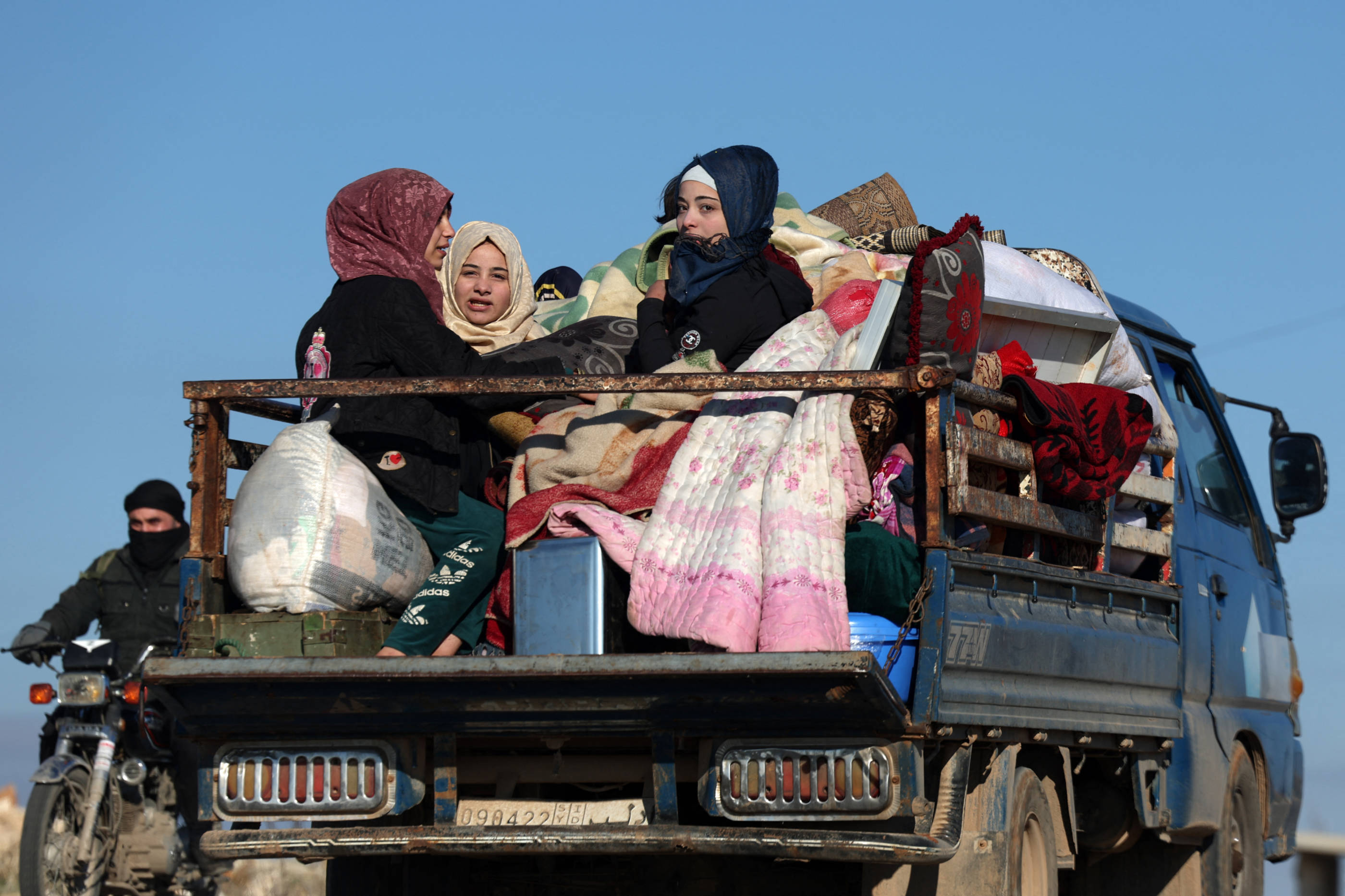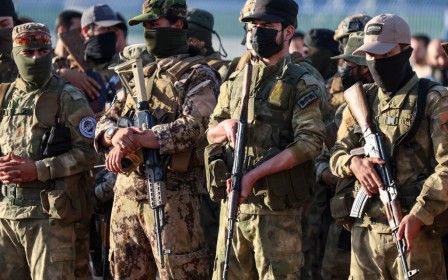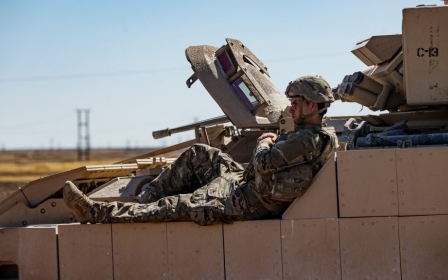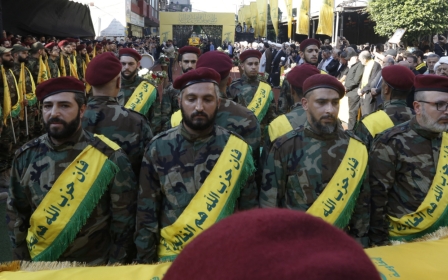Syrian rebels storm towards Aleppo in shock offensive
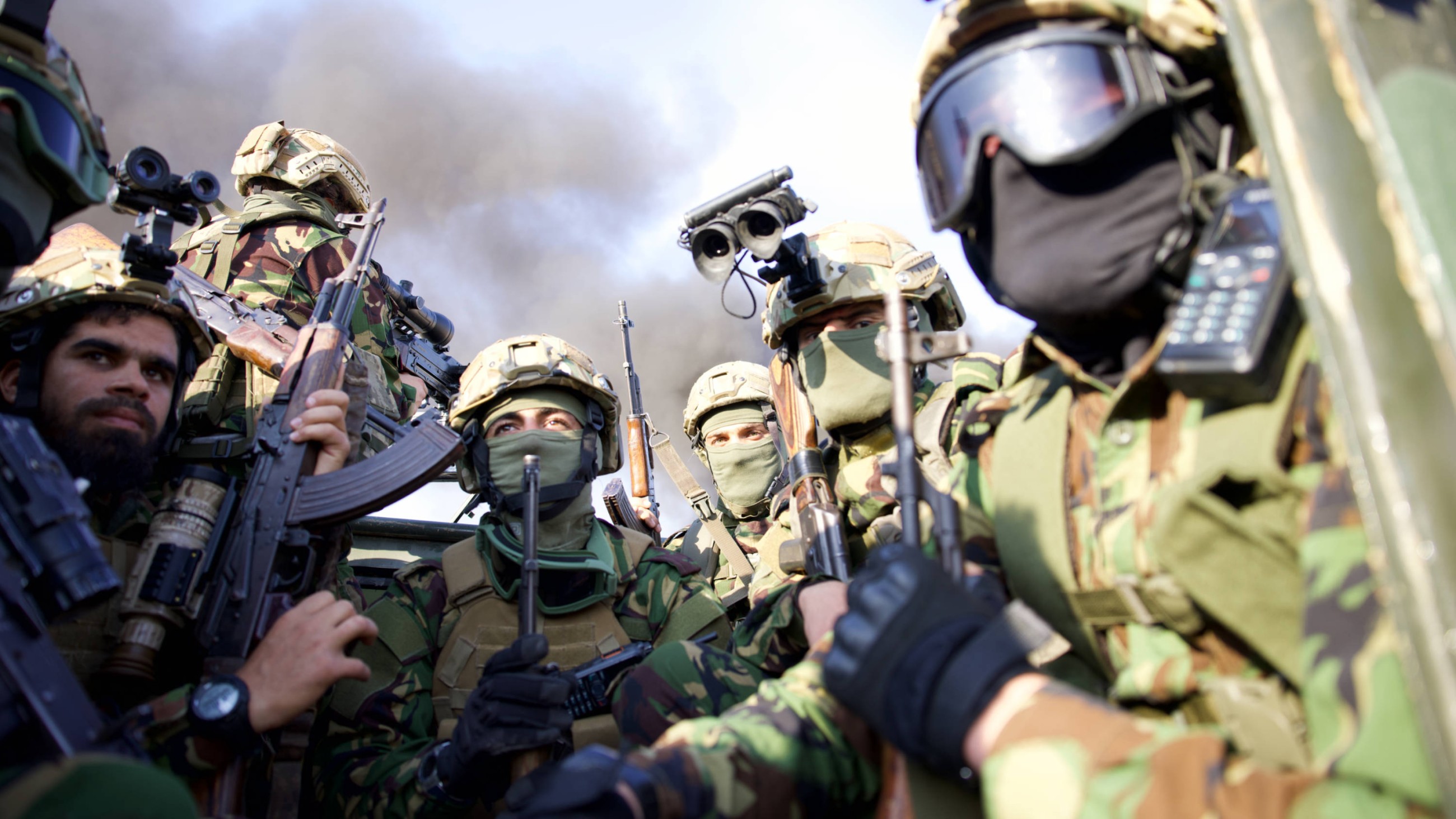
Syrian rebel forces have seized strategic villages in northwestern Syria after intense clashes with Russian-backed Syrian government forces.
The fighting erupted at dawn on Wednesday when the rebels launched a surprise operation, named "Response to the Aggression", in retaliation to the recent escalation of government shelling on rebel-held areas.
The battle was launched from areas controlled by the militant group Hayat Tahrir al-Sham (HTS), about 10km to the west of Aleppo city.
Some rebel groups affiliated with the Turkey-backed Syrian National Army (SNA) have joined the operation, though the majority of those forces have so far refrained from participating, according to reports.
Since Wednesday, footage circulating on social media has shown HTS and aligned forces making significant advances, capturing large swathes of territory and progressing rapidly towards the outskirts of Aleppo city.
New MEE newsletter: Jerusalem Dispatch
Sign up to get the latest insights and analysis on Israel-Palestine, alongside Turkey Unpacked and other MEE newsletters
Lieutenant Colonel Hassan Abdul Ghani, a rebel leader in the operation, told Middle East Eye that they had seized "highly strategic" areas.
"These areas were Iranian and Syrian military bases used to launch aggression against our areas, killing civilians and forcing them to leave their homes," Ghani said.
"Our forces have destroyed 12 enemy tanks, and the operation will continue until we eliminate the forces targeting our land."
'There is an international situation that favours this battle and chaos between Assad and his supporters, and we seized this opportunity'
- Syrian National Army leader
The official channel of the operation on WhatsApp stated that many areas have been seized so far, including the strategic Base 46, Urem al-Kubra, and Andżara town.
"Our operation aims to liberate our land from the Syrian and Iranian forces and allow its people to return to their homes safely," Ghani said.
Iran's SNN news agency reported on Thursday that Iranian Revolutionary Guards Brigadier General Kioumars Pourhashemi was killed in Aleppo by "terrorists" linked to Israel, without giving further details.
The Britain-based Syrian Observatory for Human Rights said at least 142 fighters from both sides have been killed in the past 24 hours.
A senior Turkish security source told MEE that Turkey attempted to prevent the offensive to avoid further escalating tensions in the region, especially given Israel's wars on Gaza and Lebanon.
However, efforts to use channels established by a 2019 de-escalation agreement to halt Russian and Syrian government air strikes targeting residential areas of rebel-held Idlib province had not yielded results.
“What was initially planned as a limited operation expanded as regime forces began fleeing their positions," the source said, adding that the operation aims to restore the boundaries of the Idlib de-escalation zone, which were originally agreed upon in 2019 by Russia, Turkey and Iran.
Shifting dynamics
The captured villages are situated in an area that was once a stronghold of the Nour al-Din al-Zenki rebel group. The territory fell to HTS following clashes between the two groups in 2019 and was later seized by Syrian government forces.
Today, Nour al-Din al-Zenki and HTS troops are an essential part of the operation to retake the strategic area, which is considered the lifeline between HTS and SNA-controlled territories, and the western shield of Aleppo city for the Syrian government forces.
As a result, the area was heavily fortified by Syrian President Bashar al-Assad's army and its allies, including Iran and the Lebanese Hezbollah group.
However, Israel's war on Lebanon and the unprecedented Israeli attacks targeting Hezbollah and Iran in Syria have shifted the dynamics.
A senior leader in the SNA, overseeing the current operation, told MEE that the geopolitical developments in the Middle East, which have impacted the Syrian regime's allies, had created a "golden opportunity" to launch the attack.
The leader, who preferred to remain unnamed as he is not permitted to comment, said: "There is an international situation that favours this battle and chaos between Assad and his supporters, and we seized this opportunity.
"Without their allies, the Syrian troops are nothing," he said
"We are capable of changing the equation, restoring our land, and securing a safe path to facilitate the return of displaced people to their homes."
Humanitarian disaster
The northwestern part of the country, which has been under deadly Syrian government attacks since the beginning of the Syrian revolution in 2011, is now home to 5.1 million people. According to United Nations agencies, half of the population is displaced from surrounding areas, while two million live in camps.
The Syrian Civil Defence, also known as the White Helmets, told MEE that government forces have launched around 900 attacks on the area this year, killing about 80 civilians and wounding approximately 400 others, including 19 children.
The White Helmets said hundreds of families have been displaced to unknown destinations in the past 24 hours from the western parts of Aleppo and Idlib provinces after a series of indiscriminate government attacks on the area following the rebel operation.
Mounir Mustafa, the deputy head of the Civil Defence, told MEE that Thursday's shelling targeted more than 20 villages and towns, including two camps, and that government forces used internationally banned cluster munitions in their attacks.
"A civilian was killed, and 20 others were wounded, most of them children, in these attacks. Many civilians are trapped in areas under attack and unable to flee because they have nowhere to go.
Mustafa added: "The temperature is very low, and the financial situation prevents these people, who have lost all sources of income, from moving even temporarily."
Eyes on Aleppo
Since the start of the Syrian revolution, various factions have hoped to seize control of the 5,000-year-old city of Aleppo and establish it as the capital of the rebel forces.
Hundreds of rebels lost their lives on the city’s front lines during intense battles, particularly in late 2016, as they sought to gain control of the city and break the government siege on its eastern part. However, all these efforts ultimately failed under relentless Russian and Iranian attacks.
'Without their allies, the Syrian troops are nothing. We are capable of changing the equation'
- Senior SNA leader
Before 2011, the city was home to three million people and was renowned for its kind and hard-working residents, making it the industrial capital of Syria.
Now, half of the city lies in ruins, its former inhabitants displaced - some within Syria, living in camps, others living as refugees abroad. The remaining inhabited areas have become home to Iranian and Lebanese forces.
The war has forced around 13 million people to leave their homes across Syria, with millions becoming refugees across the world, the majority in neighbouring countries.
"Our eyes are on Aleppo, and the future developments will determine the outcome," the SNA leader said.
"The nature, timing, and scale of the operation will determine its scope."
Middle East Eye delivers independent and unrivalled coverage and analysis of the Middle East, North Africa and beyond. To learn more about republishing this content and the associated fees, please fill out this form. More about MEE can be found here.


